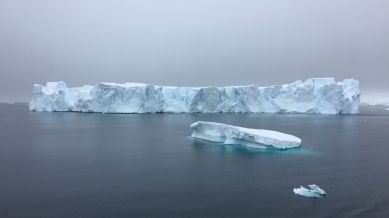The rate of melting of ice in the West Antarctica ice shelf will continue to increase rapidly over the next century no matter what we do, finds a new study.

The rate of melting of the West Antarctic ice sheet will increase over this century no matter how much we reduce fossil fuel use, according to new research. It is highly unlikely that we will avoid this significant acceleration of ice melting, meaning that the Antarctic region will contribute even more to sea level rise.
Scientists used the most powerful national supercomputer in the United Kingdom and ran simulations of ocean-driven melting of the West Antarctic Ice Sheet. The objective was simple—to find out how much of the melting is unavoidable and how much we still have control over through the reduction of greenhouse gas emissions.
You have exhausted your
monthly limit of free stories.
Read more stories for free
with an Express account.
Continue reading this and other premium stories with an Express subscription.
This premium article is free for now.
Register to read more free stories and access offers from partners.
Continue reading this and other premium stories with an Express subscription.
This content is exclusive for our subscribers.
Subscribe now to get unlimited access to The Indian Express exclusive and premium stories.
The results are grim.
Even taking into account variable climate phenomena like El Nino, the researchers found no difference between mid-range emission scenarios and scenarios where we achieve the most ambitious targets of the 2015 Paris Agreement. Even under what would be considered a best-case scenario—a 1.5 degrees Celsius increase in temperature—ice melting will increase three times faster than during the 20th century.
The West Antarctic Ice Sheet is Antartcia’s largest contributor to sea-level rise, according to the British Antarctic Survey. Previous research has indicated that this could be caused by the warming of the Southern Ocean. In particular, the Amundsen Sea region. The entire West Antarctic ice sheet has enough ice to increase the global mean sea level by as much as five metres.
Most Read
Millions of people around the world live near the sea coast, and many of them stand to lose their homes and livelihoods as unprecedented sea level rise plays out. While it is true that there is not much we can do to reverse that within this century, it does mean that we should throw up our hands in defeat.
“It looks like we’ve lost control of melting of the West Antarctic Ice Sheet. If we wanted to preserve it in its historical state, we would have needed action on climate change decades ago. The bright side is that by recognising this situation in advance, the world will have more time to adapt to the sea level rise that’s coming. If you need to abandon or substantially re-engineer a coastal region, having 50 years lead time is going to make all the difference,” said Kaitlin Naughten, lead author of the study published in the journal Nature Climate Change, in a press statement.
Essentially, we must not stop the work that is being done to reduce dependence on fossil fuels and we should refocus our efforts towards slowing the rate of sea level rise in the long-term. Also, governments around the world should begin building and working on plans to re-engineer or evacuate heavily-populated areas in coastal regions.
© IE Online Media Services Pvt Ltd
First published on: 25-10-2023 at 16:20 IST






